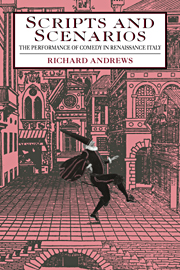Book contents
- Frontmatter
- Contents
- Preface
- Introduction: Italy in the sixteenth century
- 1 Precedents
- 2 The first ‘regular’ comedies
- 3 The second quarter-century, outside Venice
- 4 The second quarter-century, Venice and Padua
- 5 Improvised comedy
- 6 Obstacles to comedy
- 7 Scripts and scenarios
- Notes
- Chronological bibliography of comedies, 1500–1560
- General bibliography
- Index
7 - Scripts and scenarios
Published online by Cambridge University Press: 29 October 2009
- Frontmatter
- Contents
- Preface
- Introduction: Italy in the sixteenth century
- 1 Precedents
- 2 The first ‘regular’ comedies
- 3 The second quarter-century, outside Venice
- 4 The second quarter-century, Venice and Padua
- 5 Improvised comedy
- 6 Obstacles to comedy
- 7 Scripts and scenarios
- Notes
- Chronological bibliography of comedies, 1500–1560
- General bibliography
- Index
Summary
LA PELLEGRINA AS ‘SERIOUS’ COMEDY
La pellegrina as a whole, even with its cuts restored, is a well-crafted example of the kind of comedy which was required by new moralistic theory and altered taste. It has one major plot strand, the one involving Lepida, which comes straight from Ariosto's Suppositi of 1509. The heroine is seduced by, and needs to be married to, a young gentleman in disguise who has taken service in her house – this time he is a false Pedant, acting as tutor to her young brother. This involves traditional amorous schemings and misunderstandings, including a rivalry with another suitor, the potential crisis being solved by a family agnition. The comedy also offers some vulgar skirmishings among the servants, which can fairly be described as ‘comic relief’, in that they do not impinge in any real sense on either of the two major plots.
However the principal story, alluded to in the title, is not an intrigue in the strict sense at all, but a massive and very simple misunderstanding between hero and heroine. It produces refined emotional suffering, and a final almost orgasmic relief of tension when the false assumptions are removed. Lucrezio was secretly married in Valencia (or, in the revised version, in Lyon) to a virtuous young woman named Drusilla; but he had to return home to Pisa before the marriage was either made public or consummated. Subsequently he learned, on seemingly impeccable evidence, that Drusilla had died, and so never went back for her.
Information
- Type
- Chapter
- Information
- Scripts and ScenariosThe Performance of Comedy in Renaissance Italy, pp. 227 - 248Publisher: Cambridge University PressPrint publication year: 1993
